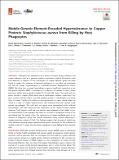Mobile-genetic-element-encoded hypertolerance to copper protects Staphylococcus aureus from killing by host phagocytes
Abstract
Pathogens are exposed to toxic levels of copper during infection, and copper tolerance may be a general virulence mechanism used by bacteria to resist host defenses. In support of this, inactivation of copper exporter genes has been found to reduce the virulence of bacterial pathogens in vivo. Here we investigate the role of copper hypertolerance in methicillin-resistant Staphylococcus aureus (MRSA). We show that a copper hypertolerance operon (copB-mco), carried on a mobile genetic element (MGE), is prevalent in a collection of invasive S. aureus strains and more widely among clonal complex 22, 30, and 398 strains. The copB and mco genes encode a copper efflux pump and a multicopper oxidase, respectively. Isogenic mutants lacking copB or mco had impaired growth in subinhibitory concentrations of copper. Transfer of a copB-mco-carrying plasmid to a naive clinical isolate resulted in a gain of copper hypertolerance and enhanced bacterial survival inside primed macrophages. The copB and mco genes were upregulated within infected macrophages, and their expression was dependent on the copper-sensitive operon repressor CsoR. Isogenic copB and mco mutants were impaired in their ability to persist intracellularly in macrophages and were less resistant to phagocytic killing in human blood than the parent strain. The importance of copper-regulated genes in resistance to phagocytic killing was further elaborated using mutants expressing a copper-insensitive variant of CsoR. Our findings suggest that the gain of mobile genetic elements carrying copper hypertolerance genes contributes to the evolution of virulent strains of S. aureus that are better equipped to resist killing by host immune cells.
Citation
Zapotoczna , M , Riboldi , G P , Moustafa , A M , Dickson , E , Narechania , A , Morrissey , J A , Planet , P J , Holden , M T G , Waldron , K J & Geoghegan , J A 2018 , ' Mobile-genetic-element-encoded hypertolerance to copper protects Staphylococcus aureus from killing by host phagocytes ' , mBio , vol. 9 , no. 5 , e00550-18 . https://doi.org/10.1128/mBio.00550-18
Publication
mBio
Status
Peer reviewed
ISSN
2150-7511Type
Journal article
Description
M.Z. and J.A.G. were supported by funding from the European Union’s Horizon 2020 research and innovation programme under grant agreement 634588. K.J.W. was supported by a Sir Henry Dale Fellowship funded by the Wellcome Trust and the Royal Society (098375/Z/12/Z). G.P.R. was funded by a CAPES Science Without Borders scholarship (BEX 2445/13-1). M.T.G.H. is funded by the Chief Scientist Office through the Scottish Infection Research Network, a part of the SHAIPI consortium (grant SIRN/10).Collections
Items in the St Andrews Research Repository are protected by copyright, with all rights reserved, unless otherwise indicated.

